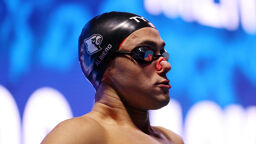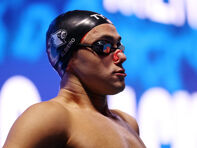I will never forget the moment I learned that openly gay diver Matthew Mitcham had won Olympic gold. I was sitting in the Washington Plaza Hotel waiting to head to the annual NLGJA convention. I would be, fittingly, sitting on a panel to talk about covering LGBT athletes. To a lot of Americans that moment meant nothing. To me, it was the gay Jesse Owens moment for which I had been longing so many years.
When Simone Manuel, a black woman, won Olympic swimming gold last night in the 100-meter freestyle, she created a moment for black Americans that I hope we can all appreciate.
While we have become accustomed to black athletes dominating the stands in sports like track and field and basketball, swimming has eluded them for many historical reasons, going back to segregation laws that largely barred them from public pools and other swimming facilities. Last night Manuel was, it seems impossible to believe, the first black American woman to stand on the top podium in an individual swimming event at the Olympics, just like Mitcham was the first out gay man to do so eight years ago.
Yet Manuel may be more like a Michael Sam than a Matthew Mitcham. The idea of a gay diver is nothing new. While he was closeted at the time, Greg Louganis, arguably the greatest Olympic diver in history, was gay and came out publicly years after his final Olympic dive. Now Tom Daley, an Olympic bronze medalist, and Brazil's Ian Matos are both out in the Rio pool. A gay diver doesn't exactly undermine stereotypes the way a gay NFL player does.
It was only this year that I learned about the stereotype that black people cannot swim. The first time I heard about it, in the journalism class I teach at the Univ. of Florida, I thought it was a joke. Natalie Hinds, a student in the class and a swimmer at Florida, made me realize it's no joke with some important and passionate thoughts about her experiences as a black woman in the lily-white sport of swimming. Hinds, a two-time SEC Champion in the 100-meter free, woke me up to the continuing struggles that black people face in various sports.
The black community has seen this before over the last two decades. When Tiger Woods burst onto the scene at Augusta National, suddenly the white strangle-hold on that sport softened. When Tony Dungy led the Indianapolis Colts to a Super Bowl win, suddenly black football coaches could reach for the same stars that their white counterparts had aspired to for years.
While we all smiled last night as the "Star-Spangled Banner" played for Manuel, it's fitting that some Americans, probably mostly black Americans, shed a tear as well. Becoming an Olympic swimming champion seems even more possible for every black girl — and boy — in America. That it took until 2016 may be something we should all shed a tear about, too.







































